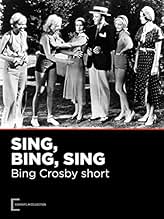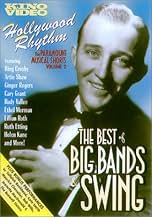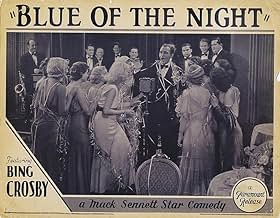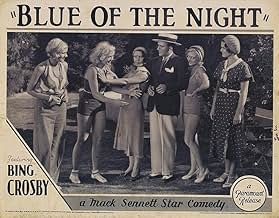Agrega una trama en tu idiomaBing Crosby as himself in a comedy of romance and mistaken identity.Bing Crosby as himself in a comedy of romance and mistaken identity.Bing Crosby as himself in a comedy of romance and mistaken identity.
Marjorie Kane
- Marian Bradley
- (as 'Babe' Kane)
Ernie Alexander
- Dancing Nightclub Patron
- (sin créditos)
Harry Barris
- Rhythm Boys Member
- (sin créditos)
Spencer Bell
- Porter
- (sin créditos)
Harry Bowen
- Train Passenger
- (sin créditos)
Barney Hellum
- Drunk Pullman Passenger
- (sin créditos)
Fay Holderness
- Train Passenger
- (sin créditos)
Bud Jamison
- Cop
- (sin créditos)
William McCall
- Conductor
- (sin créditos)
Eddie Phillips
- Party Guest in Bathing Suit
- (sin créditos)
Al Rinker
- Rhythm Boys Member
- (sin créditos)
Toby Wing
- Blonde in Bathing Suit
- (sin créditos)
Joy Winthrop
- Fainting Woman's Friend
- (sin créditos)
Argumento
¿Sabías que…?
- TriviaThe 6th out of 8 musical 2-reel shorts Crosby made for recently bankrupt producer Mack Sennett. Sennett had just lost his studio and was hired by Paramount as a unit producer. This is generally considered the best of the series, with a strong title number, attractive supporting cast and excellent production values.
- ConexionesEdited into Recuerdos que nunca mueren (1949)
Opinión destacada
I saw this today on a video cassette a friend sent to me. It was not the greatest short comedy film or even in the first two or three hundred best short features.
Good points about this is that it spotlights the young Crosby, the popular radio and record crooner, singing WHEN THE BLUE OF THE NIGHT and AUF WIEDERSEIN among other tunes. That is all to the good. But it is typical of the work of Mack Sennett...and that's to the bad.
Mack Sennett really played an important role in the early days of Hollywood and of silent comedy. Anyone responsible for just the Keystone Cops would have gotten to that position. But Sennett also brought Chaplin, Mary Pickford, Gloria Swanson, Fatty Arbuckle, Mack Swain and Ben Turpin to the screen. This is all to the good. But he never continued to grow as a creative comic director. His comedy is real knockabout, but most of the better comics (like Chaplin and Arbuckle) turned more subtle in their later years. That is why they continued growing (of course, in Arbuckle's case, his personal tragedy interfered - but he probably would have remained Chaplin and Keaton and Lloyd's equal). But Sennett never could do that. When he did his work with Crosby and (contemporary to that) with W.C.Fields it was at the tale end of his career. Fields had much to do with the humor of the six shorts they made together. Crosby just had to be agreeable and sing well. He could do that.
So the humor of this short is strained. Bing boards a train with Babe Kane and they find themselves sitting together. Everyone on the train is a honeymoon couple, and everyone suspects they are too. Ms Kane says she is not a honeymooner, but is engaged to the well known radio crooner Bing Crosby. Crosby never mentions his real identity. Later on an article appears in the newspaper regarding Kane's engagement to Crosby. This amuses her friends, mostly because it annoys Franklin Pangborn, who had said he was her fiancé (Kane tells him she never agreed to marry him).
Crosby reappears, and pretends for a moment to be a news reporter - then he reveals his real identity to Kane. But Pangborn thinks he is a phony. This leads to the idiotic final bet about the roadster against the five dollar bill from Crosby. Crosby's singing proves who he is.
Pangborn does several pratfalls into a swimming pool while in his fancy duds - a typical Sennett joke. Bud Jamison (who did better work with the Three Stooges) is a suspicious cop. The humor, for 1933, is infantile. But the singing and a look at a very young Crosby are worth seeing. So I give this a "6" out of "10".
Good points about this is that it spotlights the young Crosby, the popular radio and record crooner, singing WHEN THE BLUE OF THE NIGHT and AUF WIEDERSEIN among other tunes. That is all to the good. But it is typical of the work of Mack Sennett...and that's to the bad.
Mack Sennett really played an important role in the early days of Hollywood and of silent comedy. Anyone responsible for just the Keystone Cops would have gotten to that position. But Sennett also brought Chaplin, Mary Pickford, Gloria Swanson, Fatty Arbuckle, Mack Swain and Ben Turpin to the screen. This is all to the good. But he never continued to grow as a creative comic director. His comedy is real knockabout, but most of the better comics (like Chaplin and Arbuckle) turned more subtle in their later years. That is why they continued growing (of course, in Arbuckle's case, his personal tragedy interfered - but he probably would have remained Chaplin and Keaton and Lloyd's equal). But Sennett never could do that. When he did his work with Crosby and (contemporary to that) with W.C.Fields it was at the tale end of his career. Fields had much to do with the humor of the six shorts they made together. Crosby just had to be agreeable and sing well. He could do that.
So the humor of this short is strained. Bing boards a train with Babe Kane and they find themselves sitting together. Everyone on the train is a honeymoon couple, and everyone suspects they are too. Ms Kane says she is not a honeymooner, but is engaged to the well known radio crooner Bing Crosby. Crosby never mentions his real identity. Later on an article appears in the newspaper regarding Kane's engagement to Crosby. This amuses her friends, mostly because it annoys Franklin Pangborn, who had said he was her fiancé (Kane tells him she never agreed to marry him).
Crosby reappears, and pretends for a moment to be a news reporter - then he reveals his real identity to Kane. But Pangborn thinks he is a phony. This leads to the idiotic final bet about the roadster against the five dollar bill from Crosby. Crosby's singing proves who he is.
Pangborn does several pratfalls into a swimming pool while in his fancy duds - a typical Sennett joke. Bud Jamison (who did better work with the Three Stooges) is a suspicious cop. The humor, for 1933, is infantile. But the singing and a look at a very young Crosby are worth seeing. So I give this a "6" out of "10".
- theowinthrop
- 24 jun 2006
- Enlace permanente
Selecciones populares
Inicia sesión para calificar y agrega a la lista de videos para obtener recomendaciones personalizadas
Detalles
- Tiempo de ejecución20 minutos
- Color
- Mezcla de sonido
- Relación de aspecto
- 1.37 : 1
Contribuir a esta página
Sugiere una edición o agrega el contenido que falta















